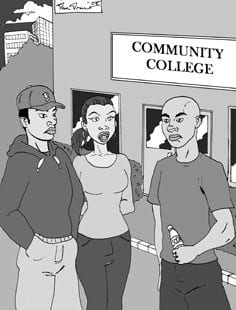
Fostering the best
|
|
“We got in, but we couldn’t get the money.” |
Many African Americans have pierced the bigotry barrier over the years to reach great heights of achievement. There have been innumerable successes in medicine, science, education, law, business, public affairs, sports, the arts and entertainment. But they all pale in comparison to what Barack Obama has achieved. The notion of an African American becoming president was recently so remote that it would not even reach “dream” status.
It is clear, now that Obama has clinched the Democratic nomination, that whites will vote for a competent, qualified black candidate for high office. It is no longer possible, then, for blacks to cite the racial prejudice of some whites as a reason for their own failure to find a way to succeed. Obama and his wife Michelle have charted the course for success — education and public service.
It is ironic that at this time of great inspiration for African Americans some banks have decided to restrict college loans to only those students who attend the nation’s leading universities. According to a recent report in The New York Times, some banks no longer make loans to students at two-year colleges or have eliminated certain benefits, like rate cuts for borrowers who pay on time.
Since these loans are guaranteed by the federal government, banks do not have to worry about the loss of their principal. However, since loans to students at two-year colleges are usually smaller than those to students at four-year schools, they are less profitable for the banks. Also, students at top colleges will be more likely to have top incomes after they graduate, and be more profitable customers.
Obama must make higher education for every qualified student a primary goal. Banks must be made to end this unwarranted discrimination.
Legalized discrimination
Victims of discrimination almost always believe that they have been unfairly rejected. This is especially true of minorities who have long been victims of racial discrimination. It is easy for minorities to believe that they are the only ones who suffer such indignities.
The recent rejection of John Walsh, CEO of the Elizabeth Grady Cos., by the board of a Beacon Hill housing cooperative demonstrates that blacks are not the only ones to suffer discrimination. Walsh wanted to purchase the lease on a unit in the building. According to news reports, Walsh was rejected because he “was not of the same social status” as the other members of the cooperative.
But one must wonder whether such a standard actually violates the law. The legal criteria are different for each type of housing arrangement.
A landlord who owns an apartment building must rent to tenants without discriminating on the basis of race, gender or religion. Social status would not be an issue. The landlord is free to sell the building to whomever he wants. Similarly, there are no restrictions on the sale of an individual condominium by an owner.
In a cooperative, the building is owned as a partnership by the residents. If one resident falls upon hard times and is unable to pay his mortgage, the other members of the cooperative must pay his share to prevent foreclosure. Consequently, the rules affecting the sale and lease of units are usually quite severe. The negative vote of only a few members can block a sale. In New York, financially solvent applicants have been similarly rejected because of questionable lifestyles.
On its face, this seems like a form of the restrictive covenants that were once used to prevent blacks from buying houses in the suburbs. But because in cooperatives the landlord is a partnership of the residents, it is unreasonable to require them to accept anyone who has the money.


![Banner [Virtual] Art Gallery](https://baystatebanner.com/wp-content/uploads/2024/04/Cagen-Luse_Men-at-store-e1713991226112-150x150.jpg)



